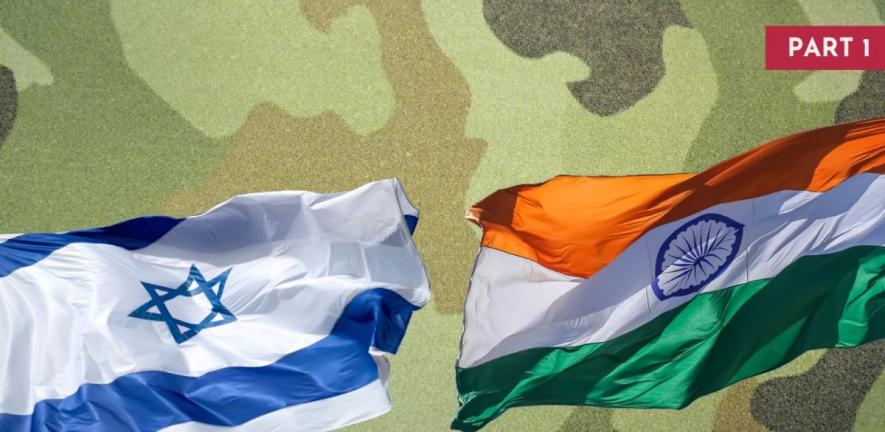India’s Arms Sales to Israel: Bad Legally, Worse Ethically- I

The Supreme Court of India’s judgment of September 9, 2024 on refusing to halt arms sales to Israel during the ongoing conflict in Gaza and West Bank is baffling, to say the least.
The court was not the only party that lacked in terms of its focus on the case, as pleadings also needed more substance. The interventions on the part of the Solicitor General of India (SGI) Tushar Mehta only served to reveal how much the State representative was at sea with the subject before the court.
To better understand the dispute, it is important to know the boundaries of extant law and the nuances of soft law and hard law.
Arms transfers to Israel violate international humanitarian law
On February 23, 2024, United Nations (UN) experts stated that “any transfer of weapons or ammunition to Israel that would be used in Gaza is likely to violate international humanitarian law and must cease immediately”.
“All States must ‘ensure respect’ for international humanitarian law by parties to an armed conflict, as required by 1949 Geneva Conventions and customary international law,” the experts said.
On February 23, 2024, United Nations (UN) experts stated “any transfer of weapons or ammunition to Israel that would be used in Gaza is likely to violate international humanitarian law and must cease immediately”.
“States must accordingly refrain from transferring any weapon or ammunition – or parts for them – if it is expected, given the facts or past patterns of behaviour, that they would be used to violate international law.
“Such transfers are prohibited even if the exporting State does not intend the arms to be used in violation of the law— or does not know with certainty that they would be used in such a way— as long as there is a clear risk,” they said.
The duty to “ensure respect” for humanitarian law applies “in all circumstances”, including when Israel claims it is countering terrorism. Military intelligence must also not be shared where there is a clear risk that it would be used to violate international humanitarian law.
International treaties and conventions
Common Article 1 (CA1) of the Geneva Conventions mandates that parties “undertake to respect and to ensure respect for the present Convention in all circumstances.” While a debate persists over the precise scope of the obligation to “respect”, it is widely accepted that it prohibits States’ complicity in international humanitarian law violations, including through arms supply or other means.
For instance, this interpretation is supported by Germany’s position in its International Court of Justice (ICJ) proceedings with Nicaragua. Germany acknowledged that CA1 imposes, at minimum, a duty to conduct “proper risk assessment” before exporting military equipment and arms.
India signed the Geneva Conventions on November 29, 1949. The country was one of the sixty-three States which signed the final Act, incorporating the four Geneva Conventions. They were ratified only 10 years later by India on August 27, 1959.
In a written reply to a parliamentary question, the government of India stated, “The principles embodied in the convention are part of general international law and therefore already part of the common law of India.”
“The provisions of the Indian Penal Code and the procedural law (Code of Criminal Procedure) provide effective penalties for persons guilty of such category of crime and take cognisance of the acts which may otherwise be taken to be in the nature of genocide, as culpable offences,” the reply further stated.
India ratified the Genocide Convention on November 9, 1950, and after ratifying it, in 1959 came with an important reservation to Article IX of the convention. The reservation dealt with not accepting the jurisdiction of the International Court of Justice (ICJ) in the event of differences in interpretation of what constituted genocide. It brought no concomitant domestic legislation and has not made the necessary changes in domestic criminal law.
India and Geneva Conventions, 1949
The Geneva Conventions lay down the rules of war, a part of these conventions include the Geneva Conventions Act of 1960, which India ratified in 1959. In spite of having ratified the Geneva Conventions then, it took rather long for India to transpose them into its domestic law.
However, the Act contained a hobbling provision (Section 17) which stated, “No court shall take cognisance of any offence under this Act except on complaint by the government or of such officer of the government as the Central government may by notification specify.
The duty to “ensure respect” for humanitarian law applies “in all circumstances”, including when Israel claims it is countering terrorism.
This was not mentioned by the Supreme Court for dismissal of the said petition and, evidently, it was not brought to the notice of the court by the SGI. One plausible reason is that the government of India would be saved from the embarrassment that it had yet to gazette the Rules to give effect to the 1960 Act till date, only 64 years later!
Responsibility of States for internationally wrongful acts
Furthermore, CA1 aligns with Article 16 of the Responsibility of States for Internationally Wrongful Acts, 2001, establishing a responsibility for all States to refrain from supplying military equipment and arms that are likely to be used in, or facilitate, serious violations of international humanitarian law or international human rights law.
India, as a State party to the four Geneva Conventions, is bound by their provisions. Moreover, these conventions’ norms are recognised as customary international law and jus cogens. Similarly, Article 16 of the Responsibility of States for Internationally Wrongful Acts, 2001 is considered a codification of customary law. Thus, India, according to Article 51 of its Constitution, is required to abide by its international obligations.
The Supreme chose to ignore universal jurisdiction
“State officials involved in arms exports may be individually criminally liable for aiding and abetting any war crimes, crimes against humanity or acts of genocide,” the experts said.
“All States under the principle of universal jurisdiction, and the International Criminal Court, may be able to investigate and prosecute such crimes,” they added.
The Indian government in abdication of its international duties
The United Nations experts stressed that the duty to “ensure respect” additionally requires all States to do everything reasonably in their power to prevent and stop violations of international humanitarian law by Israel, particularly where a State has influence through its political, military, economic or other relations.
These measures could include:
“Diplomatic dialogue and protests;
– Technical assistance to promote compliance and accountability;
– Sanctions on trade, finance, travel, technology or cooperation;
– Referral to the Security Council and the General Assembly;
– Proceedings at the International Court of Justice;
– Support for investigations by the International Criminal Court or other international legal mechanisms;
– National criminal investigations using universal jurisdiction and civil suits; and
– Requesting a meeting of the parties to the Geneva Conventions.”
Most of these measures are also relevant to fulfilling the duty to prevent genocide.
No exemption for Indian arms companies
Arms companies contributing to the production and transfer of arms to Israel and businesses investing in those companies bear their own responsibility to respect human rights, international humanitarian law and international criminal law.
“They have not publicly demonstrated the heightened human rights due diligence required of them and accordingly risk complicity in violations,” the experts said.
The government of India is yet to gazette the Rules to give effect to the 1960 Act to date, only 64 years later!
“International law does not enforce itself,” the experts said. “All States must not be complicit in international crimes through arms transfers. They must do their part to urgently end the unrelenting humanitarian catastrophe in Gaza.”
The Arms Trade Treaty, which came into force on December 24, 2014, established the first comprehensive international legal framework governing the export of military equipment and arms. India, however, has neither signed nor showcased any intention to do so, having abstained during its adoption vote.
India’s position stems from concerns that the treaty’s framework is overly restrictive for imports related to national security, arguing that such strategic considerations should remain within the purview of individual States. The argumentation is weak but a refutation of the Indian position will be provided in this series later.
Article 6 of the treaty outlines three key prohibitions on arms exports: (i) if it violates United Nations Security Council measures under Chapter VII of the Charter, particularly arms embargoes, (ii) if it contravenes relevant international obligations of international agreements of the involved parties, and (iii) if it is potentially used for grave breaches of the Geneva Conventions or in the commission of other serious international crimes.
Notably, such obligations hinge on the exporting State’s ‘knowledge’ that the arms could be used for future international law violations, making the export itself unlawful.
This differs from Article 16-based complicity, which only deems arms exports unlawful if they facilitate the actual commission of international humanitarian law breaches.
In this regard, States have acknowledged this difference, interpreting ‘knowledge’ to mean that a transfer should not be authorised if there are substantial grounds to believe that the arms would be used unlawfully in the future.
Therefore, this interpretation broadens State obligations, requiring more comprehensive risk assessments and investigations to prevent the mere possibility of international humanitarian law and international human rights law violations.
As the situation in Palestine continues to worsen, numerous institutions have comprehensively documented war crimes and other violations of international humanitarian law being committed by the parties involved in the conflict.
Given these circumstances, the knowledge threshold for such obligations has likely been met. This creates corresponding duties for States to take immediate action.
At a minimum, States should temporarily suspend all arms exports to the region and simultaneously conduct thorough investigations into the use of their previously exported arms in this conflict.
All States under the principle of universal jurisdiction, and the International Criminal Court, may be able to investigate and prosecute such crimes.
Additionally, information surrounding military equipment and arms export licences is shrouded in mystery, with very little publicly available data. In India, the Department of Defence Production usually authorises such export licences as they fall under Category 6 of the Special Chemicals, Organisms, Materials, Equipment and Technologies (SCOMET) list.
However, if the goods are dual-use, they fall under the jurisdiction of the Directorate General of Foreign Trade (DGFT) for proper authorisation. The SCOMET licence applications that are publicly available do not list specific details of the goods being sought for approval, for security concerns.
Nonetheless, the Inter-Ministerial Working Group under the DGFT is responsible for adjudicating such applications for SCOMET licences, relying on six grounds outlined in Rule 10.06 (I) of the Procedure Handbook.
These grounds include obligations under general international law as well as specific agreements, such as the Wassenaar Arrangement. Given the possibility of serious international crimes and international humanitarian law/ international human rights law violations taking place in the Gaza conflict, it is unlikely that these criteria are being met for proper export authorisations.
Wassenaar arrangement
The Wassenaar Arrangement, established on July 12, 1996, is a voluntary export control regime aimed at “promoting transparency and greater responsibility in transfers of conventional arms and dual-use goods and technologies”.
India is a participating State in the Wassenaar Arrangement and regularly contributes to the development of guidelines and procedures.
Accordingly, its obligations are not legally binding. Regardless, India is a participating State, regularly contributing to the development of guidelines and procedures.
At its core, the arrangement requires States to submit reports on their arms transfers, participate in voluntary information exchanges and notify other State parties on their export activities.
It involves two lists:
(i) Munitions List which requires States to exchange information on deliveries of conventional arms to non-Wassenaar members that fall under eight broad weapon categories: battle tanks, armoured combat vehicles, large-calibre artillery, military aircraft/unmanned aerial vehicles, military and attack helicopters, warships, missiles or missile systems, and small arms and light weapons.
(ii) Dual-Use Goods and Technologies List which requires States to submit information on export licences that were denied within mandated timelines depending on the sensitivity of the items. These lists form the foundation of the agreement’s information-sharing mechanisms.
In addition to the required information exchanges, State parties have adopted non-binding criteria for the export of small arms and light weapons, and other military equipment, aiming to incorporate these best practices into their national laws.
States have acknowledged this difference, interpreting ‘knowledge’ to mean that a transfer should not be authorised if there are substantial grounds to believe that the arms would be used unlawfully in the future.
For instance, Article 2 of the Best Practice Guidelines for Exports of Small Arms and Light Weapons (2022) outlines scenarios in which States should avoid issuing export licences.
These scenarios include potential threats to “compliance with international law governing the conduct of armed conflict” and the risk of such arms being used to “violate or suppress human rights and fundamental freedoms”.
Similar guidelines exist for all conventional weapons and dual-use goods intended for military use. However, these guidelines are advisory and non-binding for States.
Next week: Law of contracts weightier than humanitarian law
The writer is the executive director, South Asia Human Rights Documentation Centre.
Get the latest reports & analysis with people's perspective on Protests, movements & deep analytical videos, discussions of the current affairs in your Telegram app. Subscribe to NewsClick's Telegram channel & get Real-Time updates on stories, as they get published on our website.























